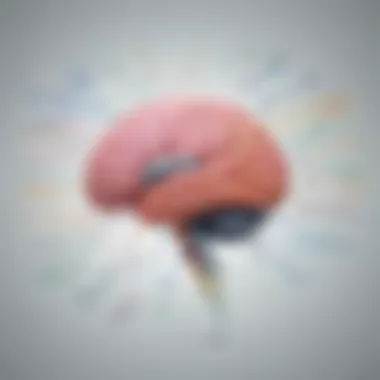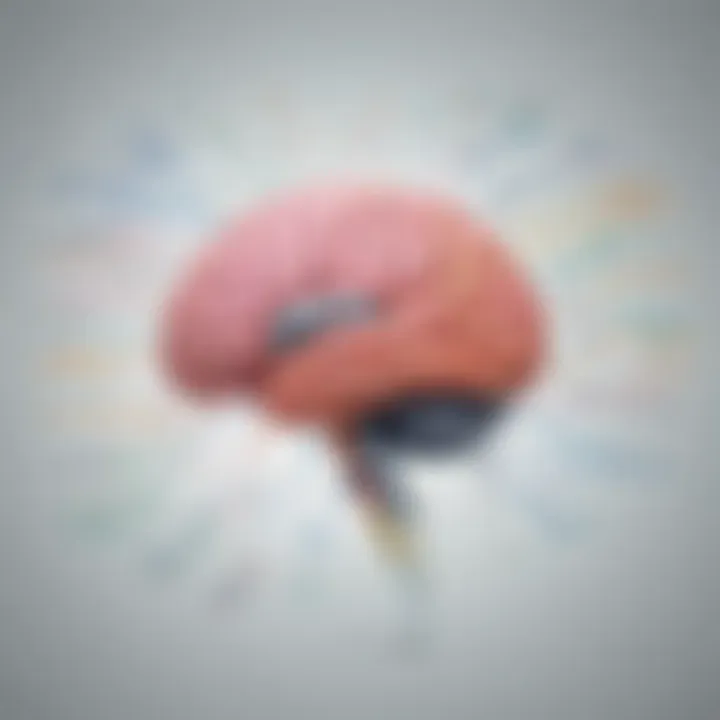Brain Hacks: Insights from Transformative Literature


Intro
In the intricate tapestry of human thought, the quest for mental enhancement has sparked a wave of interest in what many refer to as "brain hacks." These are not just clever tricks but rather methods grounded in psychological insights, often distilled from transformative literature. Books have become portals to knowledge, and navigating through their pages offers a treasure trove of techniques that can elevate cognitive function and spur personal growth.
This examination sets the stage to explore how literary works, both fiction and non-fiction, have contributed to the popularization of brain hacks. By digging into a couple of pivotal categories — Fiction and Literature, and Self-Help and Personal Development — one can observe how narratives shape thoughts and inspire behaviors. They often serve as an entry point to contemplating our own mental frameworks and personal development.
Delving into the essence of these stories and strategies, we aim to equip readers with practical applications of the lessons drawn from these influential texts, fostering a deeper understanding of how to harness one's cognitive potential in daily life.
Preface to Brain Hacks
The notion of brain hacks encapsulates a rich tapestry of techniques and strategies devoted to unlocking human potential. It's not merely a passing fad or trend; there’s a paradox of complexity infused with simplicity within these hacks. In an age where cognitive overload often leads to mental fatigue, these methods emerge as beacons of clarity. Understanding the fundamental necessity of optimizing our mental faculties is pivotal in the quest for productivity and personal growth.
Defining Brain Hacks
When we talk about brain hacks, we are diving into the myriad of methods designed to enhance cognitive processing, memory, focus, and overall mental agility. It may appear at first glance that brain hacks are merely shortcuts or quick fixes. Yet, dig a little deeper, and one discovers they often serve as pathways to a deeper understanding of our cognitive architecture. Whether it's techniques inspired by the mindfulness movements or cognitive-behavioral approaches, brain hacks thread together insights from various disciplines—including psychology, neuroscience, and even philosophy.
To put it in layman’s terms, brain hacks could be viewed as mental tools or shortcuts that allow folks to tap into and reorganize their thinking patterns. For instance, the simple act of establishing routines can effectively streamline our mental energy. Likewise, leveraging visualization methods transforms abstract ideas into concrete outcomes. These techniques do not dismiss established practices; instead, they refine and adapt them for modern-day application.
The Importance of Mental Optimization
Mental optimization isn’t just desirable; it's essential. In a world overflowing with information and distractions, honing our cognitive efficiency can feel akin to trying to fill a sieve with water. The landscape of our lives is marred with conflicting demands on our attention, often leading to burnout and diminished productivity. Brain hacks, when applied thoughtfully, can help mitigate these challenges by fostering sharper focus and increased clarity of thought.
Consider the following:
- Clarity of Purpose: With optimized mental states, individuals can hone in on what truly matters, quelling the noise surrounding them.
- Enhanced Learning Capabilities: By employing techniques that recalibrate how one processes information, learning can take on a more effective and lasting form.
- Emotional Resilience: A well-trained mind will navigate stress and emotional upheaval more adeptly, cultivating mental fortitude.
"Unlocking the power of our brains demands an acknowledgment of the landscape of mental processes we often take for granted."
In summary, understanding brain hacks and the broader idea of mental optimization is significant not merely for academic or theoretical pursuits but, more importantly, for real-world applications. It embodies the potential to refine how we learn, work, and live, providing a compass towards more meaningful engagements with both personal and professional facets of life.
Historical Context of Brain Enhancement Techniques
Understanding the historical context of brain enhancement techniques is crucial for grasping how far we've come in our quest to optimize mental function. This exploration of the past reveals the rich tapestry of beliefs, practices, and scientific breakthroughs that have influenced the field of cognitive improvement today. Often, modern techniques and theories find their roots in ancient practices, making it essential to appreciate the various historical elements at play.
A key benefit of studying this historical context is the ability to discern how cultural attitudes towards cognition have evolved. For instance, while ancient cultures might have relied on spiritual rituals or herbal remedies to enhance mental faculties, contemporary approaches lean more heavily on neurobiology and psychology. Recognizing this shift not only illustrates the changing perceptions of intellect and its enhancement but also underlines how such insights can be harnessed in our daily lives.
Ancient Methods of Cognitive Improvement
From ancient Greece's philosophical traditions to the meditative practices of Eastern cultures, cognitive improvement methods have always been part of human civilization. The Greeks, for instance, placed significant value on phronesis, or practical wisdom, engaging in discussions and dialectics as a means to refine thought processes. They believed that through rigorous debate, individuals could enhance their reasoning capabilities.
Similarly, the East introduced mindfulness and meditation, particularly through Buddhist teachings. These practices have shown undeniable effects on mental clarity and emotional regulation. Research now suggests that long-term practitioners see tangible benefits in areas like attention span and cognitive flexibility. One can't help but wonder if these intuitive understandings of the mind laid the groundwork for today’s brain hacks.
"Ancient wisdom often finds its way back, reminding us of the timeless pursuit of mental clarity and growth."
Evolution of Modern Neuroscience
As we moved into the 19th and 20th centuries, a profound shift occurred with the advent of modern neuroscience. Early pioneers such as Sigmund Freud began to unveil the complexities of the human mind, laying the groundwork for a new understanding of cognition. This period saw the emergence of various experimental methods intended to measure and enhance cognitive functions.
The discovery of neuroplasticity—a term that's now frequently used—transformed how we perceive the brain. It suggested that the brain is not static; instead, it can reorganize, form new connections, and adapt in response to learning and experience. This discovery has been pivotal in legitimizing techniques that once seemed esoteric, empowering individuals with the understanding that they can actively participate in their cognitive development.
Moreover, advancements in technology have propelled neuroscience into uncharted territories. Functional magnetic resonance imaging (fMRI) and electroencephalography (EEG) allow us to visualize brain activity and understand cognitive processes in real-time. Today, we are beginning to see innovative approaches blending these old ideas with cutting-edge neuroscience, offering a comprehensive bridge between historical insights and modern applications.
In summary, the historical context of brain enhancement techniques not only informs us about the journey of cognitive science but also prompts us to consider the narratives that have shaped our understanding of the mind. Recognizing these layers can empower us as we adopt contemporary brain hacks, reminding us that the quest for cognitive enhancement is as ancient as humanity itself.
Key Themes in Brain Hacks Literature
Exploring the realm of brain hacks leads us to several paramount themes that saturate transformative literature. These themes not only provide insights into enhancing cognitive capabilities but also underscore the importance of a holistic approach to mental optimization. As we dissect these elements, we'll recognize their relevance in daily life—whether in education, work, or personal development. The key themes include neuroplasticity, mindfulness, and goal-setting—all intertwined and offering multidimensional benefits when embraced.
Neuroplasticity and Its Impact
Neuroplasticity—essentially the brain’s remarkable ability to reorganize itself by forming new neural connections—serves as a cornerstone in the literature around brain hacks. Scientists have long recognized that our brains are not static; they adapt based on experiences, learning, and environment. This profound adaptability means that no matter your age, you can work on cognitive improvement through various practices.


Benefits of Neuroplasticity:
- Learning New Skills: Engaging in activities like learning a language or playing an instrument can physically reshape your brain.
- Recovery from Injury: Those who suffer brain injuries often find their way back to functioning through neuroplastic techniques.
- Reducing Anxiety and Depression: Mindful practices that promote adaptive thinking can modify negative thought patterns.
Think about it this way—just like a tree bends and grows to meet sunlight, our minds can shift and flourish given the right conditions. This makes embracing neuroplastic concepts not just beneficial but essential for lifelong intellectual growth.
Mindfulness and Cognitive Function
Mindfulness—the practice of being fully present and engaged in the moment—has garnered immense attention in recent years. Such a simple concept, yet it bears profound implications for cognitive function. When we talk about mindfulness in the context of brain hacks, it’s about more than just stress relief; it supports sharper focus, enhanced memory, and better decision-making.
Research has shown that practicing mindfulness can lead to significant changes in brain structure and function:
- Improved Attention: Regular mindfulness practice can increase the thickness of the prefrontal cortex, enhancing our focus.
- Enhanced Memory Retention: It's been suggested that the part of the brain responsible for memory— the hippocampus—expands in response to mindful techniques.
- Emotional Regulation: Mindfulness fosters better emotional responses, aiding in self-control and reducing impulsivity.
In sum, mindfulness isn’t merely a buzzword; it’s a powerful tool that reinforces our cognitive capabilities and emotional resilience. By actively engaging in mindfulness, we sharpen our mental faculties, leading to clearer thinking and improved problem-solving skills.
Goal-Setting and Achievement Strategies
The theme of goal-setting plays a pivotal role in the literature on brain hacks. Setting clear, actionable goals acts as a mental roadmap, fostering focus and guiding decisions. But, it's not just about writing down what you want to achieve. It encompasses the entire mindset required for success—resilience, adaptability, and a growth-oriented perspective.
A few strategic points highlight effective goal-setting:
- SMART Goals: Utilizing the SMART criteria—Specific, Measurable, Achievable, Relevant, and Time-bound—can increase clarity and accountability.
- Incremental Steps: Breaking down larger goals into smaller, manageable tasks can minimize overwhelm and create a sense of achievement along the way.
- Visualizing Success: Engaging in visualization techniques can activate the brain's cortex, as if one is actually experiencing the achievement, reinforcing motivation and focus.
Ultimately, setting goals isn’t just a way to point towards achievement; it’s a comprehensive cognitive exercise. By aligning our mindset and actions, we can elevate our performance and create pathways to success.
Through these three key themes—neuroplasticity, mindfulness, and goal-setting—the literature on brain hacks equips readers with actionable insights to enhance cognitive performance and foster personal growth. Recognizing and applying these concepts can pave the way for not only greater productivity but a fulfilling and adaptive life.
Popular Books on Brain Hacks
Reading the right books on brain hacks offers an invaluable resource for anyone looking to enhance their cognitive abilities. These texts can provide practical strategies, novel insights, and, at times, new frameworks through which we can view our thinking processes. Such literature not only opens the door to knowledge but also helps in understanding one's personal growth trajectory. The wisdom shared by knowledgeable authors can have transformative effects, guiding readers to optimize their brain functions and live a more productive life.
Overview of Influential Titles
Several titles stand out when discussing brain hacks. Each of these books carries its own charm and pedagogical approach. For instance, "Thinking, Fast and Slow" by Daniel Kahneman introduces readers to the dual processes of thought: the quick, instinctual thinking versus the slower, more deliberate thinking. By distinguishing between these two systems, readers can learn to harness the right form of processing in appropriate situations.
Another significant work is "Mindset: The New Psychology of Success" by Carol Dweck. In this book, the concept of a "growth mindset" is pivotal. Dweck argues that embracing challenges and viewing failures as opportunities to improve can vastly enhance mental resilience and adaptability. This aligns well with the core messages of many brain hacks literature.
Moreover, "The Power of Habit" by Charles Duhigg unravels the neuroscience behind habits and how altering them can lead to significant behavioral changes. Duhigg provides a structured approach to understanding habits and offers actionable steps that can lead to improved personal and professional lives.
Author Insights and Perspectives
The insights shared by authors of brain hacks literature often reflect their unique perspectives rooted in personal experience and scientific research. Daniel Kahneman’s work draws heavily on his extensive career in psychology and economics. He emphasizes that our cognitive biases often lead us astray.
Dweck's perspective comes not only from her scholarly research but also from the real-world implications of her findings, especially in education. She provides empirical evidence demonstrating that fostering a growth mindset catalyzes success in various spheres of life and supports that learning is an ongoing process.
Charles Duhigg, being a journalist, shares practical stories interwoven with research that makes the science of habit change feel accessible. Through examples from business, sports, and personal stories, he underscores how understanding habits can directly translate to personal empowerment.
In summarizing these perspectives, it becomes clear that the authors of influential brain hacks books do not merely deliver information, but rather engage in a dialogue with the reader, sharing insights that can be applied in the trenches of daily life. They advocate for an interactive approach, inviting readers to reflect on their cognitive patterns and make necessary adjustments.
"The unexamined life is not worth living." – Socrates
By diving into these texts, one does not merely collect knowledge but also embarks on a journey of self-discovery and cognitive enhancement, paving the way for lifelong learning.
Techniques for Mental Enhancement
Understanding the various techniques for mental enhancement is crucial for anyone looking to elevate their cognitive abilities. The pursuit of mental agility isn’t just for scholars or those looking to climb the corporate ladder. It extends to every facet of daily life, from improving productivity at work to fostering better relationships at home. Mental enhancement techniques are not only about rapid learning or expanded focus, they also offer tools for emotional resilience and adaptability.
Many who delve into this realm of knowledge find that they can significantly boost their quality of life, enhance problem-solving skills, and foster creativity. This chapter will explore cognitive behavioral techniques and practical exercises that serve as gateways to improved mental states.
Cognitive Behavioral Techniques


Cognitive behavioral techniques (CBT) form the backbone of many mental enhancement strategies. At its core, CBT rests on the understanding that our thoughts influence our feelings, which in turn impact our behaviors. When one recognizes this connection, it opens the door to a plethora of possibilities for change.
- Identifying Negative Thought Patterns
One of the first steps encompasses recognizing and challenging maladaptive thoughts that may cloud judgment. For example, rather than thinking, "I'm not good enough," an individual learns to reframe, "I have areas to improve, but I am capable of growth." - Behavioral Activation
This technique encourages individuals to engage in activities that bring joy or achievement, even during times of low motivation. This engagement can counteract feelings of depression and stress, releasing neurotransmitters like dopamine that contribute to happier feelings. - Mindfulness Practices
Integrating mindfulness may not seem straightforward in CBT, yet it’s powerful. Techniques such as focusing on breathing or observing one’s thoughts without judgment allows a person to break away from anxiety-inducing thoughts, creating space for clarity.
"Changing your thinking can reshape your reality," is a phrase that underscores the very essence of these techniques.
The cognitive reframing involved in CBT provides tangible pathways to mental enhancement. Engaging in these methods consistently enables one to handpick their reactions to external stimuli rather than being swept away by emotions.
Practical Exercises and Applications
Moving beyond theory, applying these techniques through practical exercises can cement new habits more effectively.
- Journaling
Keeping a daily journal encourages reflective thinking and allows individuals to articulate their thoughts and feelings. It becomes a powerful tool for monitoring progress, identifying patterns, and exploring cognitive biases. - Visualization Techniques
Athletes utilize visualization to enhance performance, and this method can be adapted for everyday tasks as well. Picture successfully completing a task—be it a presentation at work or a conversation with a loved one—before it occurs. This primes the mind for success. - Gamification of Goals
Breaking down objectives into smaller, manageable tasks gamifies the achievement process, making it rewarding and engaging. Applications like Todoist or Trello can be used to track progress visually, motivating individuals as they see their accomplishments grow. - Meditative Focus
Allocating a few minutes daily to meditation or focused breathing provides mental breaks. This practice has been shown to improve concentration and increase overall cognitive function.
- Prompt Example: Write down one positive experience from the day and analyze how you contributed to that experience.
These practical exercises enhance the effectiveness of cognitive behavioral techniques, offering individuals the chance to integrate these concepts into their daily routines seamlessly.
In understanding and implementing these mental enhancement techniques, readers stand to unlock not just improved productivity and focus but a deeper understanding of their emotional landscapes. The more adept one becomes at navigating these nuances, the richer their cognitive experience will become.
The Role of Diet and Lifestyle
When we talk about brain hacks, it's tempting to focus solely on mental techniques or cognitive exercises. However, the foundation often lies in something less flashy but equally crucial: diet and lifestyle. These two elements profoundly influence cognitive performance and, in the grand scheme of things, our overall mental well-being. From what we put on our plates to how we engage in physical activities, these choices can make or break our brain's ability to function at peak capacity.
Nutritional Influences on Cognitive Function
Nutrition is more than just fuel; it's the building block of our neurons. Eating a well-balanced diet can result in improved memory, focus, and overall brain health. For instance, omega-3 fatty acids, which are found in fish like salmon and certain seeds, have been linked to improved cognitive abilities. On the other hand, excessive sugar and processed foods can cause what’s often referred to as "brain fog," which can hinder clarity and speed of thought.
Consider including the following nutrients in your diet:
- Antioxidants: Foods like berries, dark chocolate, and green tea are packed with antioxidants that protect brain cells from damage.
- Vitamins B, C, D, and E: These vitamins play a role in brain health and cognitive function. Leafy greens, avocados, and nuts can be indispensable.
- Fiber: A fiber-rich diet supports gut health, which is increasingly recognized for its connections to brain health. Think whole grains, legumes, and vegetables.
It's also important to maintain hydration. Dehydration can impact your cognitive abilities significantly. A study hinted that even mild dehydration can negatively affect tasks requiring attention and short-term memory. So don’t forget to drink enough water throughout your day!
"A good diet not only feeds your body, it also nourishes your brain."
Physical Activity and Brain Health
You're probably aware that exercise is vital for physical health, but it’s just as key for cognitive improvement. Regular physical activity is linked to increased levels of neurotrophic factors, which support the survival of existing neurons and encourage the growth of new ones. This means that engaging in activities like jogging, swimming, or even brisk walking can enhance neuroplasticity—the brain's ability to reorganize itself.
Here are a few ways in which exercise plays a role in brain health:
- Improved Mood: Exercise releases endorphins, chemicals in the brain that act as natural painkillers and mood elevators. A better mood can lead to better focus.
- Increased Blood Flow: Physical activity increases heart rate, which in turn enhances blood flow to the brain. This increased oxygen supply can help with memory and thought processing.
- Stress Reduction: It is no secret that stress is detrimental to brain function. Regular exercise helps reduce stress levels, allowing for better concentration and cognitive flexibility.
It’s intriguing to note that the relationship between lifestyle choices and cognitive function is not merely correlative but causative too. Integrating a balanced diet with regular physical activity creates a synergy that bolsters your brain, allowing you to perform at your best both intellectually and emotionally.
Challenges and Misconceptions
Understanding the challenges and misconceptions surrounding brain hacks is crucial for anyone navigating this complex landscape of cognitive improvement strategies. Amid the proliferation of information, separating fact from fiction can be like finding a needle in a haystack. This section aims to illuminate some common myths while addressing the ethical implications that arise from enhancing brain function.
Unpacking these topics not only provides clarity but also equips readers with the knowledge to make informed decisions regarding their cognitive enhancement journeys.
Common Myths about Brain Hacks
The world of brain hacks is riddled with misconceptions that can mislead individuals searching for genuine improvement. Some of the most prevalent myths include:
- Myth of Instant Results: Many believe that brain hacks will yield immediate and dramatic changes in cognitive function. In reality, like any substantial change, enhancing the brain is often a gradual process requiring persistence and consistency.
- All Brain Hacks Are Safe: It’s not uncommon for individuals to assume that since something is marketed as beneficial, it must be entirely safe. However, the potential for adverse effects can exist, especially if techniques are improperly applied or if individuals overlook pre-existing health conditions.
- One-Size-Fits-All Solutions: People often think that what works for one person will certainly work for them. Individual differences in brain chemistry, lifestyle, and personal goals mean that these strategies need to be tailored for efficacy.
- Brain Hacks Replace Hard Work: There’s a notion that brain hacks can substitute for dedication and effort. However, these strategies should enhance rather than replace intrinsic motivation and hard work.
Recognizing these myths allows individuals to better navigate potential roadblocks on their path to cognitive enhancement, making it easier to set realistic goals.
Ethical Considerations in Brain Enhancement
As the quest for cognitive optimization continues, the ethical implications surrounding brain enhancement techniques cannot be ignored. These considerations raise quite a few eyebrows and conversations in academic and professional circles:


- Equity in Access: Concerns arise regarding who has access to enhancing techniques. The digital age has given rise to various tools, but not everyone has same access to resources or education regarding these brain hacks. This could potentially widen the gap between different socio-economic groups.
- Pressure to Perform: In competitive environments like workplaces and schools, the drive to outperform peers may lead some individuals to misuse brain enhancement techniques. This pressure could foster a culture where everyone feels compelled to enhance their cognitive abilities artificially, potentially placing undue stress on individuals.
- Long-term Effects and Dependency: Ethical discussions also include the long-term impacts of various brain enhancement techniques. Are these methods sustainable? Could reliance on cognitive enhancers lead to reduced natural cognitive abilities over time? These questions are paramount when considering how to apply brain hacks responsibly.
"Navigating the ethical implications of brain hacks isn't just prudent; it's necessary for informed decision-making."
Real-life Applications of Brain Hacks
Understanding the real-life applications of brain hacks can shed light on how theoretical concepts take shape in everyday situations. This section zeroes in on how individuals can leverage cognitive strategies gleaned from transformative literature to improve their interaction with the world around them. The practical use of brain hacks extends beyond the realm of personal development; it touches on professional settings, educational experiences, and social interactions. The holistic benefit is that by embracing these techniques, one can foster a more adaptable mindset and enhance overall cognitive efficiency.
Sales and Negotiation Techniques
When we talk about brain hacks in the context of sales and negotiation, we’re diving into an arena that hinges on psychological understanding and effective communication. Effective sales professionals are not just selling products; they’re engaging in a dance of persuasion, understanding consumer behavior and boosting their ability to connect with clients. Here are several techniques that stand out:
- Active Listening: This involves truly hearing what the customer says, considering their needs, and responding in a way that addresses those specific points. It can create a feeling of respect and understanding.
- Mirroring: Subtly mimicking the body language, tone, or expressions of the person across can foster rapport and make the other party feel at ease. People are often more inclined to strike a deal with someone they feel comfortable around.
- Framing Offers: How an offer is presented can affect its reception. Defining an offer in terms of benefits rather than features can create a narrative that resonates more with potential clients.
- Emotional Appeal: Tapping into the emotions of buyers — happiness, fear, desire — can lead to more successful negotiations. Strategically using language that evokes emotion can influence decision-making.
These techniques demonstrate that the understanding of cognitive function isn't just for the brainiac; instead, it's for anyone looking to sharpen their tools for success.
Education and Learning Environments
In educational settings, brain hacks serve as essential tools for teachers and students alike. Cognitive improvement strategies can transform how information is absorbed and retained. Here are a few considerations:
- Chunking Information: Breaking down information into smaller, manageable units can enhance comprehension and retention. For instance, instead of overwhelming students with a myriad of details, presenting information as bite-sized concepts can facilitate learning.
- Utilizing Visual Aids: Incorporating visuals, diagrams, or even mind maps can anchor understanding. Studies show that people generally recall information better when it is presented visually alongside text.
- Encouraging Questioning: Creating a culture where questioning is welcomed and encouraged allows students to engage more deeply with the material. This promotes critical thinking skills and encourages exploration beyond surface knowledge.
- Positive Reinforcement: Offering encouragement and acknowledgment can boost motivation and self-esteem. When students see that their efforts lead to positive outcomes, they are more likely to engage in the learning process.
Real-life applications of these techniques not only facilitate better educational experiences but also cultivate an environment of curiosity and growth among students. By integrating brain hacks into these settings, both learners and educators can optimize cognitive performance for lasting success.
"Applying brain hacks in real life isn't just an option; it’s a gateway to maximizing our capacity to learn, adapt, and thrive in an ever-changing world."
In sum, the importance of integrating brain hacks into practical environments cannot be overstated. By understanding and applying these techniques in sales, negotiation, education, and beyond, individuals can enhance their effectiveness and adapt to the rhythms of their professional and personal lives.
Future Directions in Brain Research
As the quest to understand and optimize the human brain continues, the realm of brain hacks looks towards innovative research and methodologies. Future directions in brain research promise possibilities that meld technology with cognitive enhancement, creating a pathway for improving mental processes. While the foundations laid by existing studies remain crucial, the next steps hold transformative potential. Significantly, these advancements could redefine how we approach learning, productivity, and mental health.
Emerging Technologies in Cognitive Enhancement
One cannot ignore the role that impending technologies will play in cognitive enhancement. Tools like neurofeedback, which provides real-time data about brain activity, enable individuals to take charge of their cognitive function. Through this technique, a person may learn to moderate their focus or emotional responses based on feedback about their mental state. Other developments, such as transcranial magnetic stimulation (TMS), offer insights into stimulating specific brain areas to improve cognitive performance.
In addition, advancements in virtual reality (VR) and augmented reality (AR) are already catching the eye of researchers aiming to enhance cognitive abilities. For instance, VR environments could simulate challenging cognitive tasks, thus allowing users to practice and hone their skills in a safe, controlled backdrop.
Moreover, the integration of artificial intelligence within brain research stands to revolutionize the landscape as well. AI-driven algorithms could analyze vast amounts of data, uncovering patterns and facilitating tailored brain hacks that cater to individual needs.
"Emerging tech offers unprecedented tools to maximize our cognitive capacities, yet we tread carefully on the ethical implications of such advancements."
Potential Impacts on Society
The societal implications of these future directions are profound. As cognitive enhancement becomes more widespread, disparities in access to these technologies may emerge. For instance, access to advanced neurotechnologies may be limited to those who can afford them, creating a divide between those who enhance their cognitive functions and those who cannot.
Furthermore, the normalization of brain hacks—a society where cognitive enhancement becomes an expected norm—might introduce new pressures. Imagine a world where mental performance metrics start to dictate educational and occupational opportunities. On one hand, this could foster a culture of excellence and efficiency, but on the other, it may erode mental health and well-being for individuals who feel they must continuously improve or compete.
While the potential for enhancing mental capabilities is enticing, there remains a pressing need for ethical guidelines. As we stand on the brink of these innovations, it’s essential to consider: How do we ensure that these advancements serve humanity as a whole, rather than fragmenting society further?
In summary, as we explore these emerging technologies and their societal impacts, a balanced approach is essential. A thoughtful discourse on the ethical implications will pave the way for using cognitive enhancements beneficially, ensuring that the path forward is inclusive and equitable.
Culmination and Personal Reflections
As we wrap up our exploration into the domain of brain hacks, it’s imperative to examine why this discussion is not just a passing phase but a relevant aspect of modern cognition. The techniques and insights derived from this literature serve not only as tools but as guiding principles for self-improvement. Engaging with transformative texts allows us to view our cognitive processes through a sharper lens, setting the stage for meaningful changes in how we think and operate.
Summarizing Key Insights
This journey into brain hacking elucidates several pivotal points:
- Neuroplasticity is a cornerstone. Our brains aren't static. They evolve based on experiences, which means that adopting new strategies can reshape our cognitive pathways.
- Mindfulness greatly influences mental clarity. By being present and fully engaged, individuals can enhance focus and reduce cognitive overload.
- Goal-setting powers personal growth. Having clear, actionable objectives not only directs our efforts but also keeps motivation levels high during the process of self-betterment.
- Continuous learning is essential. In a world that's perpetually changing, the willingness to learn and adapt isn't optional but necessary for long-term success.
"The mind is not a vessel to be filled, but a fire to be kindled."
This quote rings especially true when considering how brain hacks serve the purpose of igniting the passion for knowledge rather than simply accumulating facts.
Encouraging Lifelong Learning and Adaptation
Acknowledging the importance of lifelong learning cannot be overstated. During our lives, we encounter various challenges that demand adaptation. Embracing learning as a continuous journey fosters resilience and creativity. Each moment offers an opportunity to grow, whether through new skills in a career or understanding emotional intelligence in relationships.
- Stay curious. Cultivating a habit of asking questions and seeking out new experiences can enhance cognitive flexibility.
- Read widely. Exposure to diverse literature encourages lateral thinking and can spark innovative ideas in daily life.
- Network and collaborate. Engaging with others opens avenues for shared ideas, leading to richer insights than one can achieve alone.



